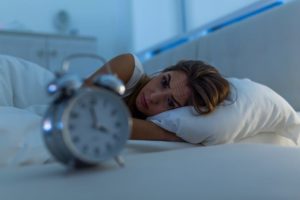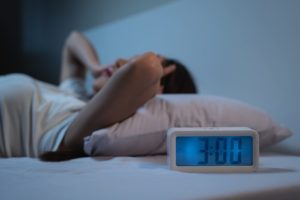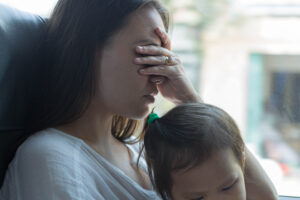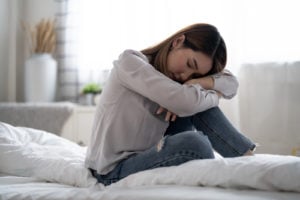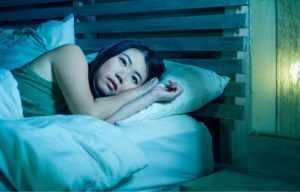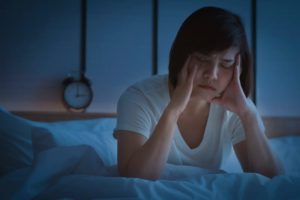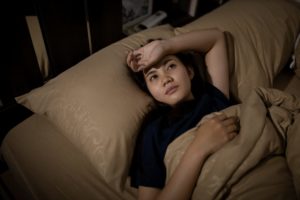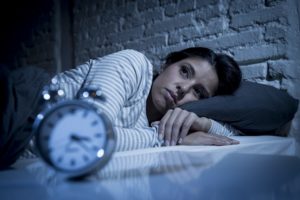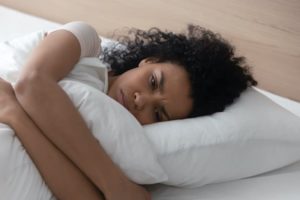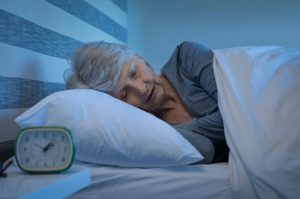Keto Insomnia: Is It Real?
The ketogenic or “keto” diet has gained popularity for weight loss and potential health benefits. However, some individuals starting the keto diet experience an unexpected roadblock – keto insomnia.
Experts have long suspected that what a person eats can impact their sleep, but limited research is available to explain why some individuals experience better or worse sleep while on the keto diet. We cover what keto insomnia is and unpack the science behind potential impacts of the keto diet on sleep.
What Is Keto Insomnia?
Keto insomnia refers to sleep disturbances that some people experience when adopting the keto diet. While this phenomenon is not universal, it’s thought to be caused by the strict restriction of carbohydrates that the diet calls for.
Common symptoms of keto insomnia include:
- Difficulty falling asleep
- Fragmented sleep
- Restlessness
The Science Behind Keto and Sleep
The keto diet is a low-carbohydrate, high-fat eating plan designed to shift the body’s metabolism into a state called ketosis, where the body primarily relies on fat for energy instead of carbohydrates. This shift occurs as carbohydrate intake is significantly reduced, prompting the body to break down fats into compounds called ketones.
Not everyone on the keto diet will experience insomnia. For those who do, it’s theorized that the immediate shift to a low-carb diet leads to a reduction in sleep-regulating chemicals like melatonin and adenosine. The body typically undergoes an adjustment period and sleep patterns tend to normalize as it adapts to the new metabolic state.
More research is needed to fully understand the impacts of keto on sleep and overall health. In addition to sleep disturbances, some people experience the “keto flu” when first adopting the keto diet. “Keto flu” symptoms include headaches, fatigue, and stomach discomfort. Talk to your doctor if you are experiencing sleep problems or other negative side effects from adopting a keto diet.

Tips to Manage Keto Insomnia
Managing keto insomnia involves adopting strategies to ease the transition and support good sleep hygiene. Gradual changes to the diet, adequate hydration, and incorporating sleep-friendly practices are among the best approaches to mitigate the potential impacts of the keto diet on sleep. These include:
- Getting at least 30 minutes of natural light early in the day
- Maintaining a consistent sleep schedule – even on weekends
- Optimizing your bedroom environment for sleep
- Avoiding caffeine at least eight hours before bed
- Limiting or eliminating alcohol at least four hours before bed
- Using the right mattress and sleep accessories
Wait – Why Am I Sleeping Better on Keto?
While some people have sleep disturbances when first adopting the keto diet, others experienced the opposite. According to a 2023 study, 65 percent of participants who followed a low-calorie keto diet for a month reported actually sleeping better. These improvements were linked to weight loss and other weight-related factors, which are known to have impacts on sleep.
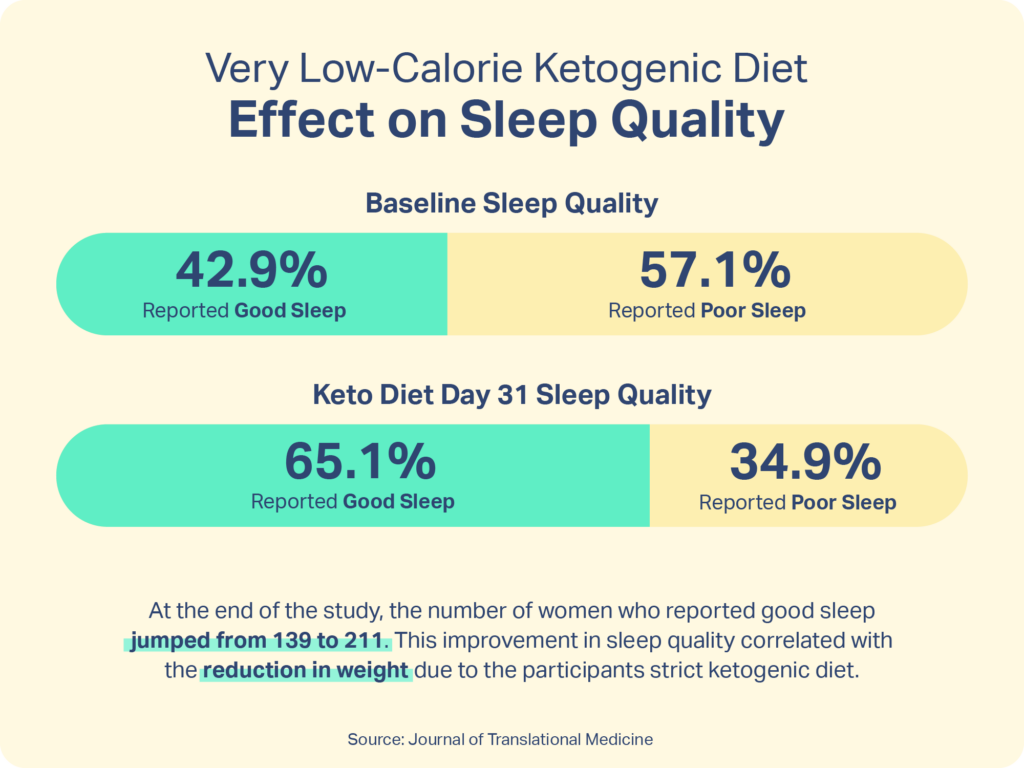
Deciding If the Keto Diet Is Right For You? Talk to Your Doctor First
If you’re considering starting the keto diet, it’s critical to consult your doctor first. Since the risks of the keto diet have not yet been studied among large groups, only your doctor can determine if it is safe for you.
The keto diet differs quite a bit from most dietary guidelines. Although the diet may promote weight loss and other benefits, it may not be safe for everyone. Those with liver, pancreas, gallbladder, and thyroid conditions should avoid the keto diet. Additionally, the keto diet is not recommended for individuals who are pregnant or breastfeeding.

Still have questions? Ask our community!
Join our Sleep Care Community — a trusted hub of sleep health professionals, product specialists, and people just like you. Whether you need expert sleep advice for your insomnia or you’re searching for the perfect mattress, we’ve got you covered. Get personalized guidance from the experts who know sleep best.
References
6 Sources
-
Zhu, H., Bi, D., Zhang, Y. et al. Ketogenic diet for human diseases: the underlying mechanisms and potential for clinical implementations. Sig Transduct Target Ther 7, 11 (2022).
https://www.nature.com/articles/s41392-021-00831-w -
Masi, D., Spoltore, M. E., Rossetti, R., Watanabe, M., Tozzi, R., Caputi, A., Risi, R., Balena, A., Gandini, O., Mariani, S., Spera, G., Gnessi, L., & Lubrano, C. (2022). The Influence of Ketone Bodies on Circadian Processes Regarding Appetite, Sleep and Hormone Release: A Systematic Review of the Literature. Nutrients, 14(7), 1410.
https://pubmed.ncbi.nlm.nih.gov/35406023/ -
Bostock, E. C. S., Kirkby, K. C., Taylor, B. V., & Hawrelak, J. A. (2020). Consumer Reports of “Keto Flu” Associated With the Ketogenic Diet. Frontiers in nutrition, 7, 20.
https://pubmed.ncbi.nlm.nih.gov/32232045/ -
Barrea, L., Verde, L., Di Lorenzo, C., Savastano, S., Colao, A., & Muscogiuri, G. (2023). Can the ketogenic diet improve our dreams? Effect of very low-calorie ketogenic diet (VLCKD) on sleep quality. Journal of Translational Medicine, 21(1).
https://translational-medicine.biomedcentral.com/articles/10.1186/s12967-023-04280-7 -
Batch, J. T., Lamsal, S. P., Adkins, M., Sultan, S., & Ramirez, M. N. (2020). Advantages and Disadvantages of the Ketogenic Diet: A Review Article. Cureus, 12(8), e9639.
https://pubmed.ncbi.nlm.nih.gov/32923239/ -
U.S. Department of Agriculture and U.S. Department of Health and Human Services. (2020 December). Dietary Guidelines for Americans, 2020-2025. 9th Edition. DietaryGuidelines.gov., Retrieved November 10, 2023, from
https://www.dietaryguidelines.gov/sites/default/files/2020-12/Dietary_Guidelines_for_Americans_2020-2025.pdf




